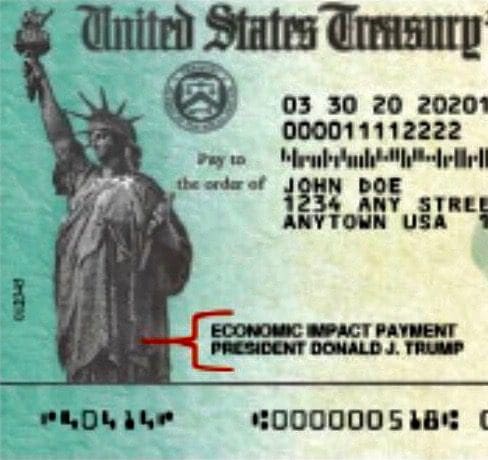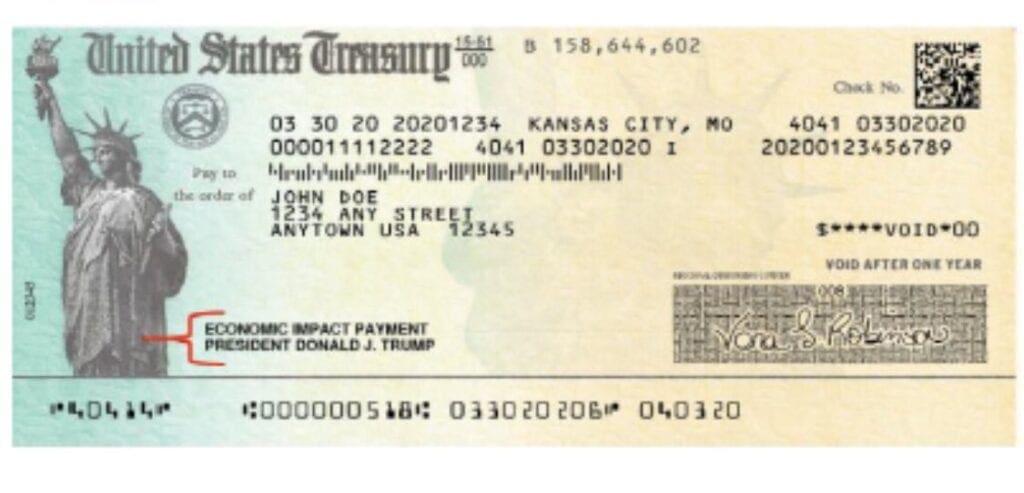Search Posts
Recent Posts
- Dr. Rosemary Costigan Named President of Community College of Rhode Island June 19, 2025
- RI Veterans: Did you know? 19.06.25 (Military Funerals, Job Fair, Benefits, Events) – John A. Cianci June 19, 2025
- East Providence First in U.S. to Equip All Firefighters with PFAS-free Gear June 19, 2025
- We Cook! Mill’s Tavern Saffron Bouillabaisse with Tarhana Lobster Jus June 19, 2025
- Rhode Island Weather for June 19, 2025 – Jack Donnelly June 19, 2025
Categories
Subscribe!
Thanks for subscribing! Please check your email for further instructions.

4th Stimulus should protect Seniors
By Herb Weiss, contributing writer on aging
As part of the Economic Impact Payment provision in the recently enacted $ 2.2 trillion stimulus bill, at press time about 80 million Americans have already received their $ 1,200 stimulus check ($2,400 for joint filers) through direct deposit. But for those 70 million Americans waiting for this payment by paper check, this Congressional handout may not be delivered to their mail box by early May, predict a Democratic Senator.
Political insiders say that we can expect to see a fourth stimulus package hammered out between the Democratic-controlled House, the GOP-led Senate and Trump, to pump billions to jumpstart the nation’s sputtering economy. A second round of cash payments may well be part of this economic stimulus package, they say.
“We could very well do a second round,” said President Donald Trump at a White House news conference held over a week ago. “It is absolutely under serious consideration,” he said.
Last week’s commentary publicized Max Richtman, president and CEO of the Washington, D.C.-based National Committee to Preserve Social Security and Medicare, call to Congress to protect seniors in a fourth stimulus package (go to https://herbweiss.blog/2020/04/12/congress-must-protect-seniors-in-phase-four-stimulus-package/).
The continuing political battle over crafting the fourth stimulus bill has been put on hold for now with Democratic and Republican congressional leaders extending recess. After conferring with public health experts, the House and Senate will not come back into session until, Monday, May 4th.
Calling on Congress to Protect Seniors During the COVID-19 Pandemic
In an April 8 letter, the Washington, DC-based Leadership Council on Aging Organizations (LCAO), representing 69 national nonprofit organizations, urged Congressional lawmakers to ensure that a fourth stimulus package will protect the health and wellbeing of seniors and their families. LCAO’s 19-page communication provides over 50 recommendations (in the areas of housing services, income security and health and community resources) that are key to helping and providing the needed support to assist seniors cope with the raging COVID-19 pandemic.

Specially, LCAO calls on Congress to put funding for affordable housing in a fourth stimulus bill, by funding $ 1.4 billion for federally assisted housing supports to make up for vacancies along with decreased rents from HUD-and USDA-assisted older adult residents, and for emergency housing assistance. Investing $1 billion for new Section 202 Homes would result in short-and long-term jobs as well as 3,800 affordable homes becoming available with service coordinators, says LCAO. Congress was also requested to allocate $450 million in emergency assistance for HUD-assisted senior housing communities, too.
LCAO opposes any attempts to weaken the nation’s Social Security and Medicare programs. The aging group strongly resists any efforts to include a provision in the stimulus bill that would eliminate the payroll contributions to these programs and pushes for the expansion of Social Security and Supplemental (SSI) benefits to enhance the income security of America’s retirees.
Over 10 million workers and retirees have earned benefits under multiemployer pension plans, says LCAO, urging Congress in their letter to allocate sufficient funds to protect the “hard-earned benefits” of these retirees.
With a growing number of the nation’s seniors relying on the support of caregivers, LCAO calls for support of older adult caregivers and children through the expansion of the refundable tax credit for “other dependents.”
Within the next five years, 25 percent of the workforce will be age 55 and over, says LCAO, noting that it becomes crucial to provide adequate funding to the Senior Community Service Employee Program for workforce training.
It’s important to protect seniors from confusing and unfair billing hospitals and payment scams. This can be accomplished by establishing standards for billing that will help seniors manage the aftermath of health care costs due to the pandemic.
Each year, Medicare loses $60 billion to fraud and abuse. LCAO also requests $20 million for the Senior Medicare Patrol to educate Medicare beneficiaries on combating fraud and abuse scams.
LCAO’s letter also asked Congress for adequate funding of mass testing for COVID-19, data collection and to accelerate Medicare enrollment to provide seniors and people with disabilities with access to needed medical treatment, two populations with the highest risk for being afflicted by the devastating virus. Congress must also ensure access and affordability to prescription drugs, says the Washington, DC-based aging advocacy group.
LCAO urged Congress to give states sufficient Medicaid funding to keep hundreds of thousands of Medicaid recipients from losing health coverage, which would increase the risk of these individuals spreading the COVID-19 virus.
The need to social distancing may force day care centers to close. LCAO says that a fourth stimulus bill package might add language within the Medicare and Medicaid Home and Community Based Service funding to authorize states to apply retainer payments to adult day care centers for the purpose of providing services to seniors outside the physical center.
LCAO also made a recommendation to prevent the unnecessary transfers of seniors to hospitals and nursing homes and support those recovering from COVID-19 by increasing beneficiary access to home health care by eliminating Medicare’s requirement that they be home bound to quality for this benefit.
LCAO’s letter supported the expanded access to hospice care by allowing physician assistants to certify need and to create a federal fund to identify and set up alternative care sites to nursing homes that meet the same minimum federal standards of care.
LCAO pushed for an additional $50 million to fund the Medicare State Health Insurance Program, a program providing unbiased, free and personalized information to assist seniors to chooses Medicare products, to help seniors understand their specific health care coverage needs under this COVID emergency.
The fourth stimulus bill, says LCAO, must also include funding to ensure providers in health care facilities and at community-based programs, be given personal protective equipment. These providers should be provided free child care and sick leaved during this crisis, too.
Considered “a frontline resource in the battling the pandemic,” LCAO calls for the adequate funding to Geriatric Workforce Enhancement Program, administered by the Health Resources Administration.
LCAO, noting the importance of federal programs that assist seniors to stay at home (including the Older Americans Act that directly serve seniors and caregivers, and the Supplemental Nutrition Assistance Program, the largest federal nutrition program), asks Congress to increase funding, benefits and streamline the application process to these programs to address healthcare and food needs during this pandemic.
With the COVID-19 virus spreading throughout the nation’s nursing homes and assisted living facilities, LCAO calls for more funding to the nation’s long-term care ombudsman program for remote online training and education of nursing facility staff and volunteers, and to the National Ombudsman Resource Center for training materials.
With elder abuse and neglect cases in the community reaching 63,000 in 2018 and an expected surge in incidences due to the pandemic, LCAO calls for funding of $ 120 million for the nation’s state and local Adult Protective Services programs in the next stimulus bill. Also, allocating $4.1 billion for the Social Service Block Grant Program can provide critical services to vulnerable seniors through adult protective services, adult day care and in-home support services, congregate and home delivered meals, case management programs.
Finally, in a fourth economic response package, LCAO calls on lawmakers to include $15 million for the Retired Senior Volunteer Program and $10 million for the Senior Companion program to provide volunteer opportunities for seniors in their communities during the pandemic crisis. Congress might also consider “easing or suspending the current age requirements for participation,” to allow younger seniors to participate.
Remember Your Older Constituents
With the Trump Administration and GOP lawmakers pushing to put billions of dollars into the fourth stimulus bill to support the nation’s large corporations and small businesses, during the COVID-19 pandemic, it is important for Congress to not forget the needs of the nation’s seniors. If you run into your Congressman or Senator, make sure you urge them to seriously consider the needs of their older constituents.
To get a copy of LCAO’s letter to Congress, go to https://www.lcao.org/files/2020/04/LCAO-April-2020-Letter-for-COVID-19-Package-4-FINAL.docx.pdf .
Published in Woonsocket Call and Pawtucket Times

Herb Weiss, LRI’12, is a Pawtucket writer covering aging, healthcare and medical issues. To purchase Taking Charge: Collected Stories on Aging Boldly, a collection of 79 of his weekly commentaries, go to herbweiss.com.
